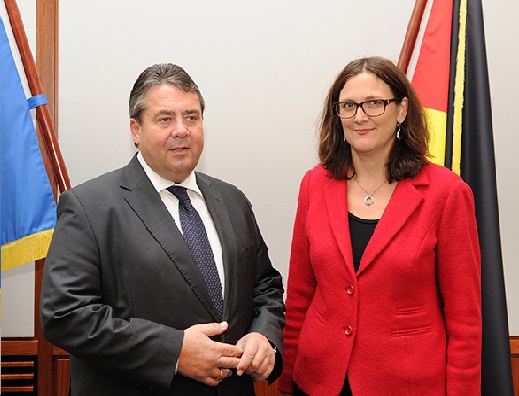
Commissioner Malmström meets with German Economy Minister Sigmar Gabriel during a SPD Conference on TTIP in Berlin.
Speeches & Official Announcements
Letter from Cecilia Malmström to British Minister of State for Trade and Investment
“There is no need to fear either for the NHS as it stands today or for changes to the NHS in [the] future, as a result of TTIP or indeed EU trade policy more broadly.“
In her letter to British Trade Minister Lord Ian Livingston, Cecilia Malmström attempts to correct some of the misconceptions circulating about TTIP and the NHS in the UK. She noted that EU member-state governments will continue to manage their public services however they see fit. Malmström also underlined the importance of the thriving private market for health services in the EU. (Europa)
Trade Delegation Arrives in Tokyo, Meets with Prime Minister Abe
Members of the congressional delegation led by Ways and Means Chairman Paul Ryan arrived in Tokyo last Wednesday to round out a trip to three countries in Asia. Upon meeting with Japan’s Minister of Economic Revitalization Akira Amari, the delegation discussed the mutual benefits that a strong TPP agreement could provide. They stressed to the Minister the need for Japan to make progress on particular market-access issues like agriculture and automobiles as well as to continue to work together for a positive outcome in rules negotiations. (Committee on Ways and Means)
TTIP: Freedom and Responsibility, by Cecilia Malmström
“The European Union and the United States are much more similar than the debates on TTIP would suggest […] on human rights and democracy, on open markets and on high standards of regulatory protection.” – Cecilia Malmström
Cecilia Malmström highlighted the importance of negotiating TTIP responsibly by making sure nothing gets in the way of high quality public services like health and water and by protecting strong regulation on health, safety, and the environment. Finally, Malmström concluded that it was important to recognize that Europe, as the world’s largest foreign investor, has an interest in rules that means investors are fairly treated. In order to promote increased transparency, national governments have an important role to play in making sure the debate around TTIP focuses on facts. (Europa)
We Should Make Sure the Future Is Written by Us, by President Barack Obama
“As we speak, China is trying to write the rules for trade in the twenty-first century. That would put our workers and our businesses at a massive disadvantage. We can’t let that happen. We should write those rules.“
In last week’s weekly Presidential address, President Obama underscored the importance of supporting good-paying jobs for US workers by opening up new markets for American goods and services. Obama sought to address concerns about past trade deals, and called on Congress to pass TPA so that the US, not China, can play a leading role in negotiating twenty-first century trade deals that protect US workers, support good wages, and help grow the middle class. (The White House)
To see the video, click here.
Remarks by Ambassador Michael Froman to the National Association of Counties
“Trade policy might not be at the top of your agenda every day. You’ve got roads to fix and schools to manage. But done right, trade policy is a necessary component of any community’s successful economic strategy. Done right, trade agreements help position the US as the most attractive place to invest and produce – a place where people want to make things, grow things, and then sell them all over the world.“
Addressing elected officials from nearly all counties in the US, Michael Froman sought to demonstrate the importance of trade on economic recovery, job creation, and “Middle Class Economics.” Froman concluded by emphasizing the need for an updated bipartisan trade promotion authority which would meet the needs of today’s global economy. It would empower America to continue leading on trade, bring jobs to individual communities and unlock opportunities for millions of Americans. (USTR)
News
Wyden Calls Trade Hearing ‘Premature’
A spokesman for Senator Rob Wyden (D-Or), ranking member on the Senate Finance Committee, said that there is still work to be done on incorporating provisions on transparency and other concerns in any bipartisan trade promotion legislation. Calling for more transparency, more oversight, and provisions to ensure American workers come out first in US trade policy, Senator Wyden stated that there was still no agreement on TPA or other aspects of legislative trade agenda. (The Hill)
TPP Accord No Longer Expected Before April
Japan and the US had hoped TPP talks would conclude as early as March, but delays reflect slow progress in US congressional procedures to grant President Obama trade promotion authority. At a news conference Friday, TPP minister Akira Amari admitted that a final accord may come later than early spring, as previously scheduled. (Japan Times)
Gabriel: Without TTIP Europe Faces Decline
The German Minister of Economic Affairs and Energy, Sigmar Gabriel, warned that Asia will become the dominant force in world trade should the TTIP negotiations with the United States fail. Gabriel also criticized some parts of the German public for spreading unsubstantiated fears about TTIP, instead of engaging in a public discourse based on facts. To address concerns in Germany about ISDS, Gabriel proposed the creation of an international court that is responsible for investment disputes. (Weser Kurier) – Original Article in German
Recent Analysis
Tactics Over Strategy: The United States and the Global Trading Order
Amy Studdart, deputy director and fellow at CSIS, argues that the Obama administration needs to make sure that short term political tactics don’t undermine their long-term strategy on trade. At a time when the US is leading an effort to rewrite the global trading system, describing trade agreements and the WTO as tools for enforcing US rules and serving US interests–rather than as mutually-agreed upon frameworks which broadly serve the global good–is counterproductive to the Obama administration’s goals of concluding its ambitious trade agenda. (CSIS)
The Spiral of Silence – How Anti-TTIP Groups Dominate German Online Media and Set the Tone for TTIP Opinion
ECIPE’s Matthias Bauer notes that in Germany, eighty-five percent of all TTIP-related positions in German online media are originally authored and spread by anti-TTIP groups. These anti-TTIP activities shape public opinion and feed back into traditional print and audio-visual media. It is time for the advocates of TTIP – not only in Germany – to make their voice heard beyond conferences and official hearings in order to prevent the spiral of silence to put an end to a promising trade agreement. (ECIPE)
TTIP – Not So Bad After All?
Jan Gavert, a correspondent for the German public news service ARD, argues that TTIP will be beneficial for Europe. Gavert explains that EU companies are responsible for more than half of all international dispute settlement arbitrations. A TTIP agreement without ISDS would undermine these existing dispute settlement bodies. Moreover, Gavert contends that TTIP will not only benefit international corporations, but also allow German SMEs to gain better access to the American market. Finally, he points out that many consumer protections regulations in the United States are equal or more stringent than their counterparts in Europe. He warns that, without TTIP, China and other players will shape global consumer standards in the future.(Tagesschau) – Original Article in German
Recognize the Benefits of TTIP (Transatlantic Economic Forum by the German Chambers of Commerce and Industry and the Federation of the German Industries)
The two leading German business federations argue that TTIP offers Germany a big opportunity to profit from more trade that is governed by better rules. The President of the German Chambers of Commerce, Schweitzer, stated that businesses want a trade deal that reduces red tape in the customs process. This would help SMEs in particular because small corporations cannot afford to deal with all the different customs specifications. Finally, the two business federations stressed that better access to the American market could prove to be a boon for the export-reliant German economy. (Finanz Nachrichten) – Original Article in German
Upcoming Events
The Importance of Cross-Border Data Flows for Traditional Industries – February 24 in Washington, DC; hosted by ITIF – More Information
Keeping Our Edge: Jobs, Exports, and Global Competitiveness – February 25 in Washington, DC; hosted by Bloomberg Government – More Information
European Financial Regulation and Transatlantic Collaboration with Commissioner Jonathan Hill – February 25 in Washington, DC; hosted by the Brookings Institution – More Information
TTIP – New Business Opportunities for SMEs – February 26 in Brussels; hosted by EuroChambres – More Information
Committee Hearing: Congress and US Tariff Policy -February 26 in Washington, DC; hosted by the United States Senate Committee on Finance – More Information
Cecilia Malmström: TTIP – The Benefits of Lifting Barriers – February 26 in Luxembourg; hosted by Université du Luxembourg – More Information
Conversation with the Chair: US Senate Commerce, Science, and Transportation Committee -February 26 in Washington, DC; hosted by The National Journal – More Information
Can Europe Recover? With Manfred Weber – February 27 in Washington, DC; hosted by The SAIS Center for Transatlantic Relations – More Information
ISDS Beyond TTIP: EU Reforms and Impacts on the Global South – March 4 in Brussels; hosted by TNI – More Information
The Next Round of TTIP Negotiations will take place in Washington in April.

